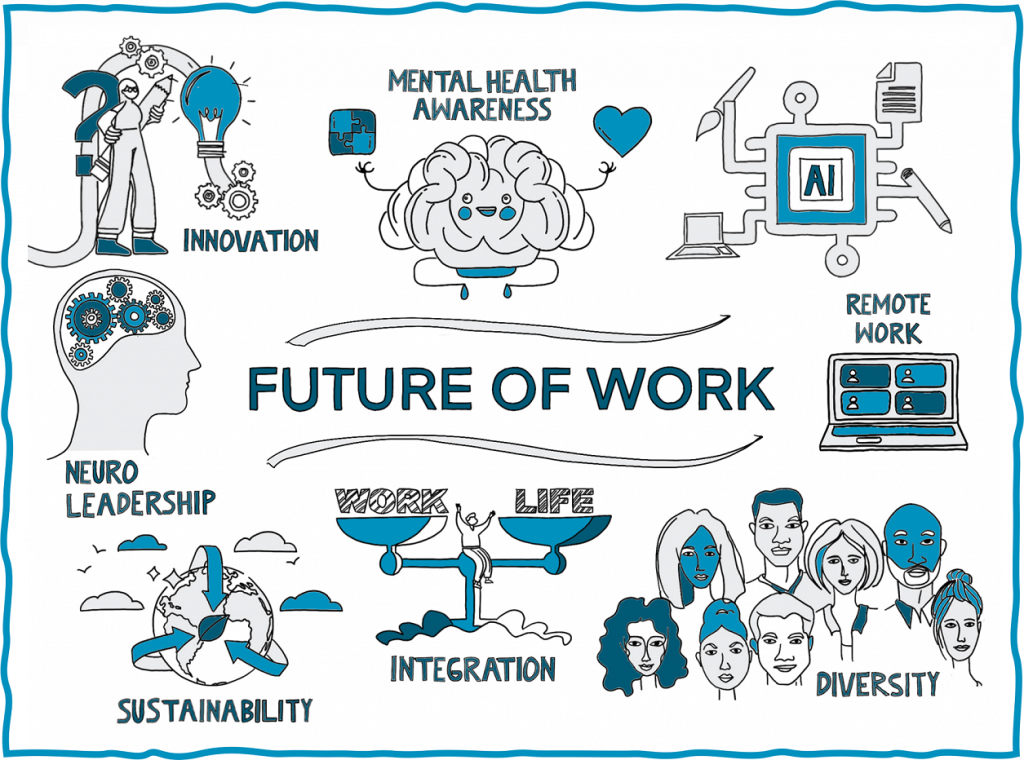13 NEW WORK HABITS FOR A RADICALLY CHANGING WORLD

Careers come and go! Jobs change!
This is nothing new it’s just happening far faster than ever before!
You are involved in something Big: The shift to an entirely new economy…… a new age…… a vastly differently approach in the way organizations operate. We are already experiencing it and it will continue. Work is going and has gone global. We are in the middle of Information Age. The economy is shifting more and more toward services, and towards knowledge work. Before long top management absolutely won’t be able to run things the old way, even if they desperately want to. New technologies, especially computers and telecommunications, have already created intense, worldwide competition for business. Right now, competition for your very own job is intense and is coming from practically anywhere on earth.
Careers people have already quit working like they used to. That’s not really anybody’s fault. But employees and organizations are very much at fault if they too don’t change in order to adapt. It does us no good whatsoever to complain or be bitter about what’s happening. In fact such behavior can only do us harm. We waste precious energy if we resist, get angry, or give in to grief over all that’s being lost. We jeopardize our future if we cling to old assumptions and expectations about how careers should operate. Frankly, the world doesn’t care about our opinions or our feelings. The world rewards only those of us who catch onto what’s happening, who invest our energy in finding and seizing the opportunities brought about by change. And change always comes bearing gifts. Considering the scope and speed of change these days, there will be precious gifts many priceless opportunities for those us who play by the new rules, position ourselves right, and take personal responsibility for our future.
Meet the challenge. Follow these 13 guidelines to manage your job if you must pull through radical change.
- Become a quick-change artist. You think you understand the situation but what you don’t understand is that the situation just changed. The only way organizations can hope to survive is to keep reshaping, shifting, and flexing itself. Shoot for rapid recovery. Instant alignment. Take personal responsibility for adapting to change, just like you would if you accepted a new job with a new employer.
- Commit fully to your job. They are only putting in a nickel, but they want a dollar! Expect your employer to expect more from you. The reason? The market place is demanding far more these days from the organization itself. This is not the same as asking you to be loyal to the organization, this is job commitment! Strong job commitment makes work far more satisfying and is therapeutic. It is also an excellent antidote for stress and a fine cure for the pain of change. It also empowers you, bringing out your very best potential, and making your more valuable employee. Bottom line-commitment is a gift you should give to yourself.
- Speed up. Heard of microwave fireplace…. You can lay down in front of the fire all night in eight minutes. Well, not really-but doesn’t it seem that’s the direction this world is moving us towards? When you examine the corporate body count over the last dozen years or so, you will find that “slow” kills a company. So many of the changes you see going on these days are designed to help organizations pick up speed. These are not casual moves or random acts dreamed up by bored heartless top executives. What you are witnessing are raw survival instincts at work. Organizations must accelerate or they will die…. And so will careers. Bottom line – if the organization decides to turn on a dime, follow it like a trailer corner quickly and turn for turn!
- Accept ambiguity and uncertainty. The certainty of misery is better than the misery of uncertainty. During change, there will be times where you will be trying to pin down your job responsibilities. And, we all know that pinning down your job during change is like trying to nail Jell-O to the wall. It would be wise for you to learn to create role clarity for yourself. Take personal responsibility for figuring out the top priorities, then point yourself in that direction. Since you will be going on guess work to some extent, your ability to tolerate ambiguity and uncertainty will still stand as a critical skill. Develop your ability to improve, even reduce it to an art form. And simply accept the fact that your work life is going to be fuzzy around edges. Indeed, trying to manage your career will resemble E.L Doctorow’s description of how it feels when writing a book:” It’s like driving at night in the fog.”
- Behave like you are in business for yourself. We are in this alone. Your employer wants more than your body, more than just your arms, back, and brain. Your employer wants you to act like an owner. One reason is because organizations are breaking into bits and getting flatter. There’s less hierarchy, fewer layers. The move is towards small scale, decentralized business unit sort of like mini-enterprises, or self-contained work groups that operate more independently. So now we are seeing a lot of self-directed teams. Besides all of this, thinking of yourself as “self employed” is the mindset that serves you best in the years to come. Organizations simply aren’t going to look out for people’s careers like they did in the past. Odds are you are on your own. Much like an independent contractor, you have to build your business, uphold your reputation, and satisfy the people who pay you for the work.
- Stay in school. Keep learning. Sign up for training classes, and keep abreast of new business processes, stop saying, “I’ll let him/her learn that” or “I don’t have time.” Bottom line is: defend your career by developing a better package of knowledge and skills than the next person. It doesn’t take long for skills and knowledge to get outdated in a fast-changing world if you are not willing to learn and keep up with the business from all angles. You may have the knowledge, but there will be someone else who has both knowledge and skills.
- Hold yourself accountable for outcomes. Somebody has to do something, and it is just incredibly pathetic that it has to be us. Responsibility, power, and authority are being pushed down to the lowest levels. For this to work, you have to stand accountable for results. Careers simply carry more personal exposure these days, and you can’t get off hook by rationalizing. The more intent you are on achieving the targeted outcomes, the less tolerant you will be of clumsy or unnecessary work processes. Having to personally shoulder accountability for results gives you a great incentive to clean out the clutter in how the place operates. So do your part, don’t bog down yourself, your co-workers, or your report with unnecessary tasks. Drive the organization directly towards the outcomes that count the most. You may be doing just fine now…. but who is to say you couldn’t do better! Push yourself to get better and do better.
- Add value. Make sure you contribute more than you cost. Employees often mislead themselves, assuming they should get to keep their jobs if they are responsible and do good work. Some of them even have the idea that sticking around for a long time makes them worth more to the organization. Sure, experience may count for something, but maybe not and the company can’t afford to rely solely on experience either. It’s not good enough anymore to just “put in your time”. It’s your contribution that counts not the hours (or years) you put in, or how busy you are. You will be better off if you think in terms of being paid for your performance and for the value you add rather than for your tenure, good intentions, or activity level. Prove your worth to the organization. Make a difference and add something very important would be missing if you left. Value addition counts far more than presence and loyalty.
- See yourself as a service center. Your job security depends on how valuable you are to your customers. The better you serve them, the better you protect your career. To do this, you need to understand where you fit into the picture, what does it take to please them, and how you can contribute to their success. No matter who your customers are (internal or external), unless you take plains to provide the best possible service, they will stop supporting your services and the worth of your company will go down. Build a strong relationship and deliver the highest quality service possible. Anticipate their needs and develop a reputation for responsiveness. Customers are your only source of job security.
- Manage your own morale. Saddling someone with the job of keeping you contented and upbeat at work is a slick move, but is no longer a valid one. If you put someone else in charge of your morale, you disempower yourself. If you wait around for higher management to heal your wounded spirit, you are far better off to assign yourself personally responsible for attitude control. Don’t let low morale drain away precious energy, destroy your self-confidence, or damage your attractiveness as a job candidate; make the necessary changes. Rapid organization change guarantees us that almost everybody is going to carry some battle scars in the years to come. You can be bitter about how your career gets affected, or you can make necessary changes to overcome it. You can carry a grudge to your grave, or you “get over it”.
- Practice Kaizen (pronounced ky’zen which, is the Japanese term for continuous improvement). Kaizen is the relentless quest for a better way, a higher quality craftsmanship. Kaizen keeps you reaching, stretching to outdo yesterday. The continuous improvements may come bit by bit, but enough of these small, incremental gains will eventually add up to a valuable competitive advantage. The spirit of Kaizen can trigger dramatic breakthroughs. No one can afford to rest anymore. Circumstances change too quickly and competition gets tougher and more global all the time, “so-so” by tomorrow.
Every single employee should assume personal responsibility; your response time, quality, cost control, and customer service should all show steady gains. And your skills should be in a state of constant renewal. Granted, this drive towards an ever-improving performances doesn’t guarantee job security, better salaries, or promotions. You still can be a victim of circumstances, even in strong, financially successful organizations. But if you have passionately practiced Kaizen, you will have built your competency level. Your track record will help sell you somewhere higher with better options.
- Be fixer, not a finger pointer. We have only one person to blame, and that’s each other. Actually, we know that problems will always exist with change and hinder us in doing our job. Build a name for yourself as a problem-solver, and you will be a valuable person to have around. Organizations need people to take care of problems, not merely point them out. So, if you have a problem or complaint that’s fine, but don’t just vocalize your problem or complaint, also offer some suggestions solve it.
- Alter your expectations. Organization can’t stop the world from changing. The best they can do is adapt. The smart ones change before they have to. The lucky ones manage to scramble and adjust when push comes to shove. The rest are losers, and they become history. Too often, employees rest on their past achievements, instead of requiring themselves to constantly upgrade their skills. Don’t fall into trap of assuming that you are automatically “entitled” to pay increases, promotions, or even your job…. even if you perform well.
Circumstances can change and will keep changing. The best thing is to stay flexible and never convince yourself into thinking your employer is supposed to protect your future. The era of entitlement is ending. Instead of relying on your rights, take personal responsibility for your career. Put your faith in the future….and in yourself. Embrace change, and develop the work habits you need for job success.
For that work in the public service who are used to empty dry routines, their attitude to change might be completely different. But they cannot escape the changes taking place in the world of work. The earlier each person takes responsibility for their self-development, the better.
#End








